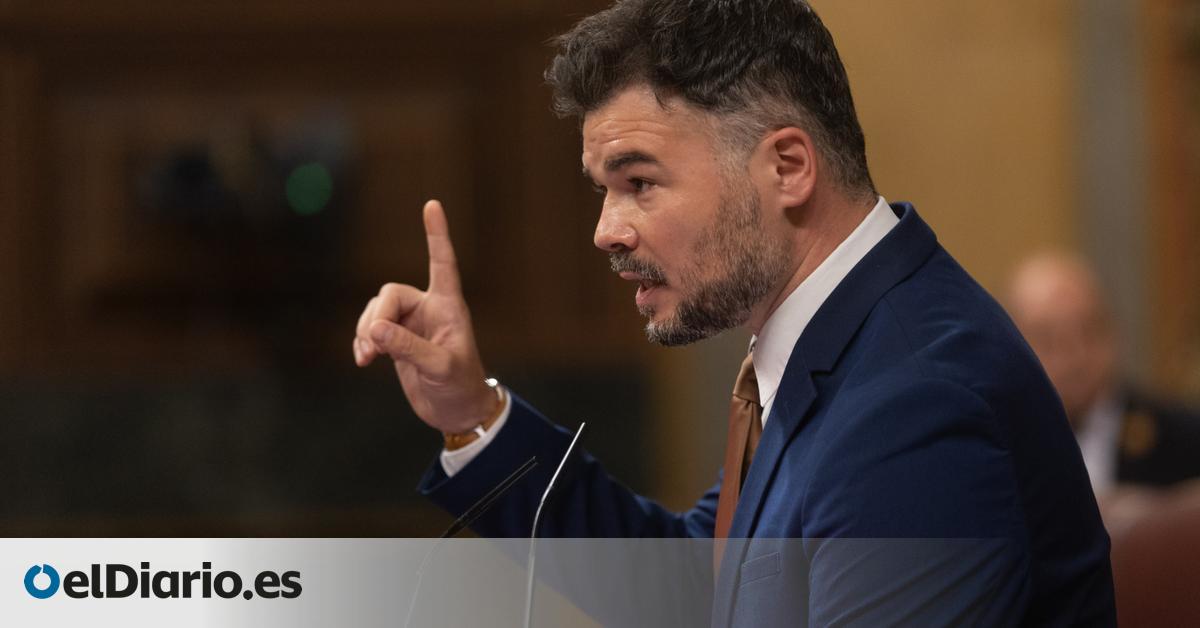
The government’s parliamentary partners generally welcome most of the measures that Pedro Sánchez proposed this Wednesday in Congress as part of his plan for democratic regeneration, but they are calling for the legislature to be “restarted” – which was paralysed during the long electoral cycle – in order to confront the rise of the extreme right and reconnect with the progressive electorate.
Although he did not specify the formula for approving these initiatives, the head of the Executive did propose obliging the media to make public how they are financed and who their shareholders are, limiting institutional advertising – all of which coincides with a European directive already in force –, greater transparency from the Government and an electoral reform that regulates candidate debates and sheds more light on how polls are conducted.
But ERC, EH Bildu, PNV, Junts, BNG and Podemos agree that the Executive must be more ambitious in its proposals, that reforms in the judicial and media spheres must be more in-depth, and that all this must be accompanied by a social shift in the government strategy with concrete measures to address two of the main problems affecting the middle and working classes: access to housing and rising prices.
At the extraordinary plenary session on Wednesday, the members also issued a final warning to the Executive, which has become a constant practically since the socialist leader came to power in 2018 thanks to the motion of censure against Mariano Rajoy: he must comply in the shortest possible time with all the commitments acquired with each of his allies at the time when support for that motion was negotiated, then for his investiture in 2019 and, last November, for his re-election.
All of this requires a more thorough repeal of the gag law – ERC and EH Bildu demand, for example, the prohibition of rubber bullets or the immediate return of immigrants –, the negotiation of measures that limit rental prices and solve the problems generated by touristification, as well as the expansion of packages to deal with inflation.
Even Sumar, the force with which the PSOE governs in coalition, demanded that Sánchez during the plenary session dare to propose a more ambitious plan than the one announced “to socialize power.” “In Spain, democracy is surrounded by powers that act like private corporations,” said Íñigo Errejón in the tribune, who assured that “the meat” of the measures announced by the president. He asked “to control the largest private powers and subject them to the collective interest.” “This model, dying neoliberalism, takes bodies and minds to the limit, as well as, according to him, “the planet.” “It is irrational, unjust and unsustainable,” he added, demanding that Sánchez replace it “with a fair and free society.”
Sánchez repeated throughout the session that yes, he will fulfill “all” of the promises he made to his partners. But, as they have reproached him, they are already accustomed to the head of the Executive telling them so in Congress in each of his appearances and, afterwards, those commitments are delayed for different reasons of the moment argued by Moncloa.
ERC calls for “more left”
From ERC, the party with which the socialists are negotiating the investiture of Salvador Illa in Catalonia amid pressure for the agreement to be reached as soon as possible, they ask Sánchez for more “courage”. “Beyond what he has announced,” said the parliamentary spokesman for the Republicans, Gabriel Rufián, “what we propose to him is more State, more regulatory State, more social policies, more left, more progressivism, more intervention in strategic sectors such as housing, public services and employment.”
The remainder of the legislature should focus, in her opinion, on an “expansion of social and civil rights”, so that there are “neither handouts nor patches”. Miriam Nogueras, from Junts, specifically asked for measures so that a case like that of the political police of Mariano Rajoy’s government, who illegally spied on and manoeuvred against Catalan independence leaders or Podemos deputies, cannot be repeated.
EH Bildu spokesperson in Congress, Mertxe Aizpurua, considered that the outline of Sánchez’s regeneration plan “doesn’t sound bad”, but warned that “for the democratic rupture” that she believes is necessary in the State “political will and courage are needed”. For this reason, the leader of the pro-independence party believes that Sánchez’s claim to democratic progress “is neither structural nor deep”.
Aizpurua insisted that the “majorities” in Parliament that support Sánchez “were set up to democratise the pillars of the 1978 regime” and regretted that “progress is scarce”. “It is time to restart the legislature and begin this new phase because the problems are piling up and the social majorities are waiting for answers”, she concluded. Like Rufián, the leader of EH Bildu also demanded measures in terms of housing and price regulation.
Official secrets and pacts with the PP
The PNV’s main criticism of the President of the Government had to do with the failure to fulfil his commitments and, as is usual, the way in which Sánchez communicated his measures to his partners, at the same time as to the rest of the citizens and not in private meetings. But the spokesman for the Basque nationalists, Aitor Esteban, welcomed the fact that among the measures announced by the head of the Executive is the reform of the law on official secrets that has been constantly requested by the PNV. Not doing so, said Esteban, would be “a reflection of the imperfection and weakness of Spanish democracy”.
The nationalist leader expressed his doubts about the obligation of transparency promised by Sánchez for the media. In his opinion, in order to regulate the press, one must “be very careful” or “better not to be careful at all.” “Democracy is such because it allows even the freedom of expression of those who attack it,” he concluded.
The most critical of Sánchez’s announcement was precisely a former minister, the leader of Podemos, Ione Belarra. The secretary general of Podemos spoke of “trap measures” and censured them because the PSOE “has just agreed with the PP an agreement that legitimises the judicial dirty war”. “With the PP, which illegally spied on 55 Podemos deputies, which orchestrates the harassment of his family”, she recalled. “If he defends Justice, the honest judges, he has to break that agreement with the PP. He comes to give them carte blanche to continue making judicial coups”, added Belarra.
For Podemos, “democratic regeneration is the opposite of the grand coalition, of returning to bipartisan practices.” And Belarra accused Sánchez of using “the democratic majority” that made him president to now turn his back on him and “bury the possibilities of transformation, which is what people expected on June 23.” The leader of Podemos even questioned her future support for the Executive without a turn to the left that also deepens the reform of justice and the fight against “lawfare.”
In a less harsh tone, the spokesman for the BNG in Congress, Néstor Rego, regretted that Sánchez’s regeneration plan did not include commitments made with his political force, such as a real repeal of the gag law, which, as announced by the Executive, will now be limited to ending only one of its points, the one that prohibits recording by the security forces of the State.
“We demand that what has been agreed with us be fully complied with,” insisted Rego, in line with other partners in the Executive such as ERC and EH Bildu. In addition to considering that the measures announced by Sánchez have fallen “short”, the nationalist leader was also very critical of the agreements between the PP and PSOE. “If what they want is to continue making pacts with the PP and break their commitments, don’t count on us,” he concluded.
Sanchez expresses his “will” to reach an agreement
Aware of the pressure from his partners, Sánchez took advantage of his turns to reply and counter-reply to try to re-establish alliances, disrupted by a long electoral cycle that ended just a month ago with the European elections. “We have an absolute will to reach agreements for the regeneration plan,” said the head of the Executive, who was “delighted” to hear the contributions of these parliamentary allies whom he urged to speak during the round of contacts that will be launched next week.
What he achieves in these meetings will determine the future of the legislature and his own survival in Moncloa. If they go well, he will be in a position to ask for the support of these partners for the 2025 Budgets on which the Government is already working. But if the allies continue without seeing their expectations met, they will not hesitate, according to their claims, to highlight the weakness of the Executive in the parliamentary votes that are to come, also those referring to the norms and laws included in the regeneration plan.
Source: www.eldiario.es

